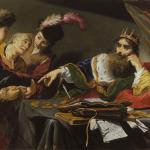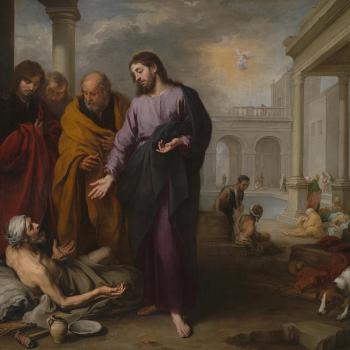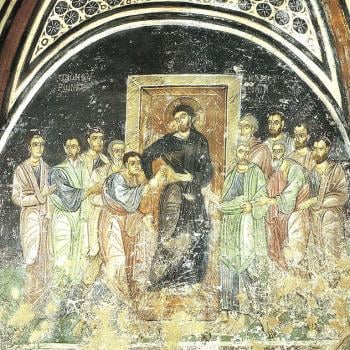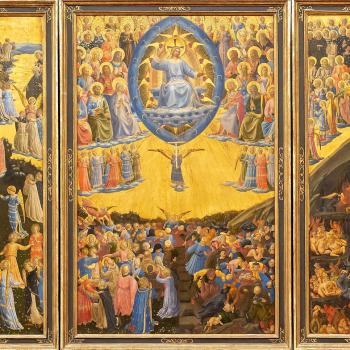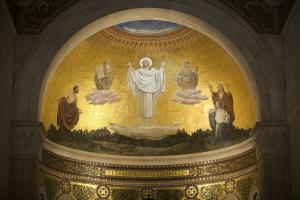
The Transfiguration is a special event in world history. God reveals to us in the Transfiguration of Christ that the glory of God can and will be shared with material creation, meaning, matter itself can participate in God’s glory and be transfigured by it. This is why some consider the Transfiguration to be an eschatological revelation because it revealed to us the truth of the immanent eschaton, that is, God is with us in Jesus. At the Transfiguration we are given a glimpse of Jesus’ transcendent divinity, but are also show that this transcendent glory can be apprehended by material being. We are shown that we can and should try to participate in that glory today, that is, we do not have to wait to the end of our lives, or the end of time to do so; the immanence of the eschaton in the incarnation means there is no absolute separation between time and eternity (though they remain distinct, even as Jesus’ two natures remain distinct). Time is bound by and exists in eternity in such a way that all of time is influenced by and partakes of eternity. The bridge which connects eternity and time together, the bridge which allows temporal creation to realize, at least in part, its eternal glory in its temporality is Jesus, for in him, creation and creator are one (and yet distinct). This is why, though the Transfiguration gives us a revelation of the divinity of Christ (and of the Trinity as well), it also reveals to us the way God works with humanity, indeed all creation, by sharing with all the uncreated light of grace, that is, the uncreated energy of God, a truth revealed in the way it was shared with Christ’s humanity:
And after six days Jesus took with him Peter and James and John his brother, and led them up a high mountain apart. And he was transfigured before them, and his face shone like the sun, and his garments became white as light. And behold, there appeared to them Moses and Elijah, talking with him. And Peter said to Jesus, “Lord, it is well that we are here; if you wish, I will make three booths here, one for you and one for Moses and one for Elijah.” He was still speaking, when lo, a bright cloud overshadowed them, and a voice from the cloud said, “This is my beloved Son, with whom I am well pleased; listen to him.” When the disciples heard this, they fell on their faces, and were filled with awe. But Jesus came and touched them, saying, “Rise, and have no fear.” And when they lifted up their eyes, they saw no one but Jesus only. And as they were coming down the mountain, Jesus commanded them, “Tell no one the vision, until the Son of man is raised from the dead” (Matt. 11:1-9 RSV).
As Jesus was being transfigured, the three apostles who were with him also saw Moses and Elijah by his side, the great saints of old who represented the law (Moses) and the prophets (Elijah) at the event. By allowing them to share in this wonderous event, God has shown them great respect and honor, even as they came to show such honor and respect to Jesus. They were touched by the uncreated light and became filled with grace, even as Peter, James, and John experienced and received as share of that grace for themselves. They, and all that Moses and Elijah represented, should therefore be treated with high regard and admiration. Christians should know God gave them enlightening grace , a grace which they then shared with others as they interacted with God and did as God wanted them to do during their temporal existence, and this, then, opened them up to partake of the kingdom of God and to be shown participating in it at the Transfiguration. Christians, therefore, should not distance themselves from the law and the prophets, but rather look to see the way Christ connects with and continues the revelation which was given by them. By being there, by showing that they participate in and experience the kingdom of God, we are also confirmed that what is revealed in and through Jesus, that humanity can partake of the kingdom of God and be transfigured by it, is true not just for Jesus but for all. That is, we, being human, should not be surprised if we can and will share in that glory, share in the light, the light of grace, and become holy in and through our participation of it:
For since he is the “sun of justice” [ Mal 4:2], he fittingly also names his disciples, “light of the world.” For through them, as if through shining rays, he has poured the light of his knowledge on the entire world. For by showing the light of truth, they scattered the darkness of error from people’s hearts. [1]
The glory of the kingdom of God truly is with us, as the eschaton has become immanent; it is something which we can partake of in our temporal existence. When we do so, we will find ourselves changed for the better, and if we do not resist it and its work upon us, we will find it will render us holy. Anyone who find themselves open to that light and experience its glory for themselves during their temporal existence represent those who fulfill what Christ said when he said that there will be some who will not die before the coming of the kingdom of God:
Eternal life, the grace-bestowing vision of the kingdom of God, is available in this world, according to the meaning of this dogma; it is as if a new ascent to Mount Tabor and contemplation of the Lord’s glory takes place. The power of the transfiguration is the kingdom of God, and the “some” who did not taste death before they saw the kingdom of God are not only the disciples but all who commune in eternal life and who are expressly honored with the vision of God’s glory.[2]
Let us, therefore, seek the kingdom of God, realizing that even now, we can partake of it, that is, we can partake of the eschatological glory in our temporal existence. In Christ, the eschaton is immanent, and the kingdom of God is within us. Let us open up to that glory, and in doing so, confirm our place in the kingdom of God. “Therefore, brethren, be the more zealous to confirm your call and election, for if you do this you will never fall; so there will be richly provided for you an entrance into the eternal kingdom of our Lord and Savior Jesus Christ” (2 Ptr. 1:10-11 RSV). When we do this, we will prove to all we really are the children of God, for God’s glory will be able to be seen by others working in and through us.
[1] St. Chromatius of Aquileia, Sermons and Tractates on Matthew. Trans. Thomas P. Scheck (New York: Newman Press, 2018), 189 [Tractate 19].
[2] Sergius Bulgakov, “On the Kingdom of God” in The Sophiology of Death. Essays on Eschatology: Personal, Political, Universal. Trans. Roberto J. De La Noval (Eugene, OR: Cascade Books, 2021), 13.
Stay in touch! Like A Little Bit of Nothing on Facebook.
If you liked what you read, please consider sharing it with your friends and family!
N.B.: While I read comments to moderate them, I rarely respond to them. If I don’t respond to your comment directly, don’t assume I am unthankful for it. I appreciate it. But I want readers to feel free to ask questions, and hopefully, dialogue with each other. I have shared what I wanted to say, though some responses will get a brief reply by me, or, if I find it interesting and something I can engage fully, as the foundation for another post. I have had many posts inspired or improved upon thanks to my readers.


